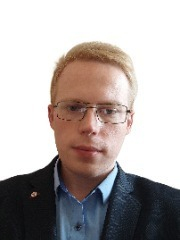Vladimir Aleksandrovich Derkachev
Senior lecturer
Institute of Radioengineering Systems and Control
Research interests:
The main scientific interests relate to the field of research of electromagnetic processes of scattering of radio waves on small-sized air objects of a multi-rotor type, neural network methods for classifying objects, methods of machine modeling of radio engineering devices, semi-active radar.
Research projects:
In 2019, a grant was received from the Fund for Assistance to the Development of Small Forms of Enterprises in the Scientific and Technical Sphere to carry out research work and assess the prospects for the commercial use of the results as part of the implementation of the innovative project "Development of a radar image analyzer based on artificial intelligence for ornithological flight support".
Teaching:
-
Mathematical modeling in radio electronic means
Objectives: students mastering the principles and methods of researching radio-electronic devices by means of mathematical and simulation modeling of their work, familiarization with modern means of their modeling, as well as with the basics of automation of analysis and design of radio engineering and telecommunication systems and their components. Tasks: obtaining skills in the analysis and design of functional units and devices of radio and telecommunication systems, application of programming skills to solving engineering problems
-
Data exchange protocols of radio communication networks
Objectives: to give students an idea of the principles of building modern networks and radio communication systems, as well as the structures of protocol complexes for the implementation of control of data exchange processes in radio communication. Tasks: assimilation of technologies and structures of modern networks and radio communication systems; standards for their construction; structures and purpose of protocols, their relationship.
-
Radar systems and complexes
Objectives: education of a student in the field of analysis and design of radar devices and systems for detection, recognition, resolution of location objects, determination of their location and motion parameters in space. Objectives: to master the basic physical and mathematical principles of construction, methods of analysis and synthesis of modern radar facilities, their characteristics and the relationship between the operational and technical parameters of systems.
-
The use of complexes and means of electronic warfare
Objectives: to familiarize students with the history of the development and formation of electronic warfare (EW) and electronic countermeasures, as well as the use of electronic protection in various tactical conditions. Tasks: principles of construction and functioning of electronic warfare systems; methods for analyzing the main characteristics of electronic warfare systems; EW efficiency criteria.
-
Fundamentals of the theory of radio navigation systems and complexes
Objectives: to study the theoretical foundations, general principles of construction and operation of radio navigation systems. Tasks: study of basic radar methods of position determination and methods for calculating position determination errors; familiarization with the basic principles of building radar and radio navigation systems, with their system-technical characteristics and system-forming relationships that determine the interaction of functional units of the system;
-
Fundamentals of radio communication theory
Objectives: mastering the necessary theoretical foundations for building radio-technical information transmission systems. The discipline gives a general idea of the current state of the theory and technology of information transmission systems, the prospects for its development, the role of the main issues studied here in the subsequent practical professional activities of university graduates, significantly expands its special theoretical training. The discipline is basic for all subsequent special disciplines. Tasks: to give the student the knowledge and ability to determine algorithms for the formation and optimal processing of radio signals against the background of interference, to draw up functional diagrams of devices based on them, ensuring the implementation of such algorithms by modern means of radio electronics and computer technology, to assess the quality of functioning of such devices in real conditions.
